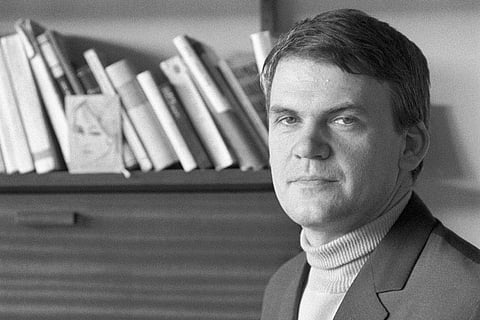
- LIFESTYLE
- FASHION
- FOOD
- ENTERTAINMENT
- EVENTS
- CULTURE
- VIDEOS
- WEB STORIES
- GALLERIES
- GADGETS
- CAR & BIKE
- SOCIETY
- TRAVEL
- NORTH EAST
- INDULGE CONNECT

Milan Kundera, whose dissident writings in communist Czechoslovakia transformed him into an exiled satirist of totalitarianism, passed away in Paris at the age of 94, Czech media said Wednesday. Milan’s renowned novel, The Unbearable Lightness of Being, opens wrenchingly with Soviet tanks rolling through Prague, the Czech capital that was the author’s home until he moved to France in 1975.
Weaving together themes of love and exile, politics and the deeply personal, Milan’s novel won critical acclaim, earning him a wide readership among Westerners who embraced both his anti-Soviet subversion and the eroticism threaded through many of his works.
“If someone had told me as a boy: One day you will see your nation vanish from the world, I would have considered it nonsense, something I couldn’t possibly imagine. A man knows he is mortal, but he takes it for granted that his nation possesses a kind of eternal life,” he told the author Philip Roth in an interview in 1980, the year before he became a naturalized French citizen.
In 1989, the Velvet Revolution pushed Communists from power and Milan’s nation was reborn as the Czech Republic, but by then he had made a new life — and a complete identity — in his attic apartment on Paris’ Left Bank.
To say his relationship with the land of his birth was complex would be an understatement. He returned to the Czech Republic rarely and incognito, even after the fall of the Iron Curtain. His final works, written in French, were never translated into Czech.
The Unbearable Lightness of Being,’ which won him such acclaim and was made into a film in 1988, was not published in the Czech Republic until 2006, 17 years after the Velvet Revolution, although it was available in Czech since 1985 from a compatriot who founded a publishing house in exile in Canada. It topped the best-seller list for weeks and, the following year, Milan won the State Award for Literature for it.
Milan’s wife, Vera, was an essential companion to a reclusive man who eschewed technology — his translator, his social secretary, and ultimately his buffer against the outside world. It was she who fostered his friendship with Roth by serving as their linguistic go-between, and — according to a 1985 profile of the couple — it was she who took his calls and handled the inevitable demands on a world-famous author.
The writings of Milan, whose first novel The Joke opens with a young man who is dispatched to the mines after making light of communist slogans, was banned in Czechoslovakia after the Soviet invasion of Prague in 1968, when he also lost his job as a professor of cinema. He had been writing novels and plays since 1953.
Milan refused to appear on camera, rejected any annotation when his complete published works were released in 2011, and would not allow any digital copies of his writing. In a June 2012 speech to the French National Library — which was re-read on French radio by a friend — he said he feared for the future of literature.
“It seems to me that time, which continues its march pitilessly, is beginning to endanger books. It’s because of this anguish that, for several years now, I have in all my contracts a clause stipulating that they must be published only in the traditional form of a book, that they be read only on paper and not on a screen,” he said. “People walk in the street, they no longer have contact with those around them, they don’t even see the homes they pass, they have wires hanging from their ears. They gesticulate, they should, they look at no one and no one looks at them. I ask myself, do they even read books anymore? It’s possible, but for how much longer?”
His loyalty to the printed word meant that it was possible for readers to find criticism and biographies of Milan to download, but not his works themselves. Despite his fierce protection of his private life — he gave only a handful of interviews and kept his biographical information to a bare minimum.